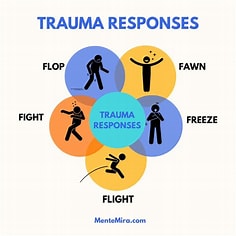514.223.5327
MAKE AN APPOINTMENTA Few new F words for you
We have inherited nervous systems that automatically and instinctually react when faced with threat, pain or stress. While crucial for our survival, they can become maladaptive if the danger is not as big as we perceive it to be and if the reactions persist after the danger has passed. You’ve likely heard of the fight or flight response. Less well known are the freeze, faint/flop and fawn responses.
Fight
With the fight response you feel a surge of adrenaline, irritability, anger, and/or tension. You might become argumentative and have an urge to confront the perceived threat by lashing out verbally or physically. This can give us the illusion of power when we feel out of control, but it can strain our relationships.
Flight
With the flight response we feel an urge to avoid a threatening situation. You might avoid confrontation by seeking physical or emotional distance. You might feel anxious, restless, and experience social isolation.
Freeze
If we cannot fight or flee a threat, the freeze response is designed to help us to avoid detection from the predator or not feel its full impact if the danger is inevitable. You might feel suck, unable to move, dissociated or numb.
Faint/Flop
During the freeze response our vitals can drop so low that we faint. We more commonly experience flop with light-headedness, a sudden drop in energy or extreme fatigue. You might feel a sense of resignation, helplessness and hopelessness.
Fawn
This is experienced as people pleasing, compliance, putting other peoples’ needs above your own, conflict avoidance, difficulty saying no or setting boundaries, being afraid of abandonment or rejection. This can create a pattern of others taking advantage of you and result in a lack of self-worth, difficulty identifying your needs, repressed anger and physical tension.
These responses are automatic biological reactions, and we are all susceptible to them. We may experience all of them, or we may have tendencies for specific ones. If you can understand what is happening (in the moment or even later when you reflect upon it) you can have more compassion for yourself. If you or anyone you know need help to develop more adaptive coping mechanisms in the face of threat, pain or stress our team is available to help. You can reach us on the contact page of our website www.wellnessinmind.ca or by phone 514 223 5327 or by email info@wellnessinmind.ca.
Written by Shawna Atkins, Ph.D., OPQ., Psychologist

